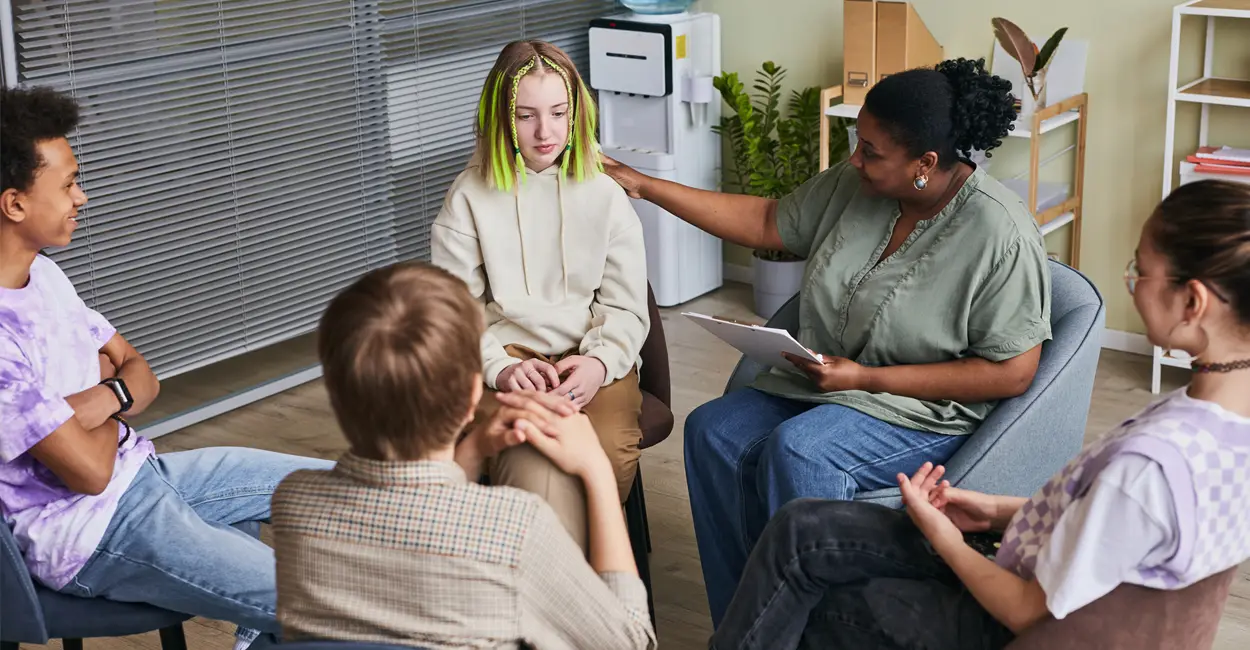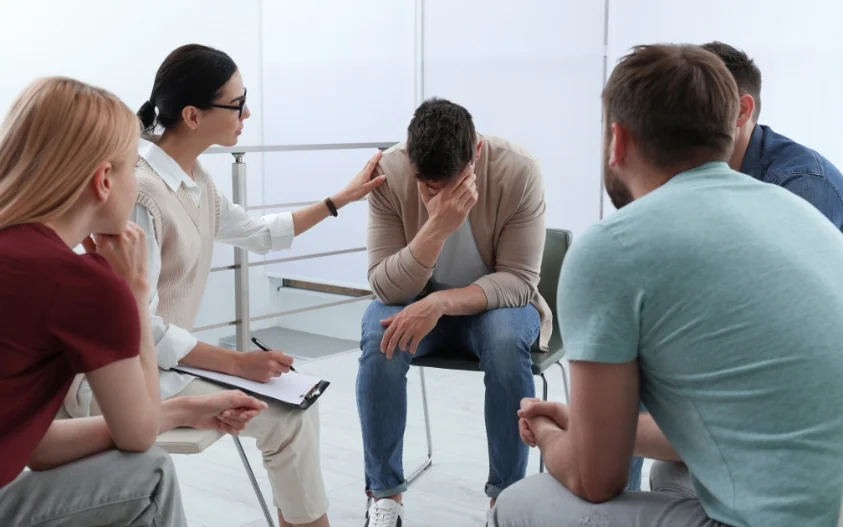24/7 Helpline:
(866) 899-111424/7 Helpline:
(866) 899-1114
Learn more about Group Therapy centers in Blythe
Group Therapy in Other Cities

Other Insurance Options

Humana

Premera

Ambetter

American Behavioral

UMR

Amerigroup

Access to Recovery (ATR) Voucher

EmblemHealth

MVP Healthcare
Beacon

Evernorth

AllWell

Group Health Incorporated

Molina Healthcare

WellPoint

PHCS Network

Holman Group

Sliding scale payment assistance

BlueShield

Magellan Health

VARP – Metcalf Recovery Ranch
VARP – Metcalf Recovery Ranch is a non-profit rehab located in Blythe, California. VARP – Metcalf Re...

Riverside County Department of Mental Health
Riverside County Department of Mental Health is a public rehab located in Blythe, California. Rivers...




Corona Regional Medical Center – Behavioral Health
Corona Regional Medical Center – Behavioral Health is a private rehab located in Corona, California....

Ranch Recovery Centers – Hacienda Valdez
The Ranch Recovery Centers is a drug and alcohol addiction rehab nestled in Desert Hot Springs, Cali...

Riverside County Department of Mental Health – Children’s Interagency Program
Riverside County Department of Mental Health – Children’s Interagency Program is a public rehab loca...

Full Circle Recovery
Full Circle Recovery is a private rehab located in Norco, California. Full Circle Recovery specializ...

Hemet Valley Recovery Center and Sage Retreat
Hemet Valley Recovery Center & Sage Retreat, in Hemet, California, is an integrative drug and alcoho...

Oasis Community Services
Oasis Community Services is a private rehab located in Indio, California. Oasis Community Services s...

ATS – Addiction Therapeutic Services
ATS offers drug, alcohol, and mental health outpatient treatment programs for adults and adolescents...

Riverside County Substance Use Program
Riverside County Substance Use Program is a counseling clinic located in Indio, CA. Riverside County...

Hope Recovery Center
Hope Recovery Center is a non-profit rehab located in Corona, California. Hope Recovery Center speci...

Riverside Recovery Resources – Omega Program
Riverside Recovery Resources – Omega Program is a private rehab located in Lake Elsinore, California...

U Turn for Christ
Located in Perris, California, U Turn for Christ is a discipleship ministry for men and women strugg...

Adolescent Academy
Adolescent Academy is a private rehab located in Murrieta, California. Adolescent Academy specialize...

Hill Alcohol and Drug Treatment Center
Hill Alcohol and Drug Treatment Center offers intensive outpatient treatment for individuals with al...

ABC Recovery Center
ABC Recovery Center promotes wellness and healing for all stages of recovery - from detox, to reside...

The Ranch Recovery
Ranch Recovery Centers is a drug and alcohol addiction treatment center for men and women located in...

Victor Community Support Services
Victor Community Support Services is a private rehab located in Lake Elsinore, California. Victor Co...

ACE Programs Management
ACE Programs Management is a private rehab located in Hemet, California. ACE Programs Management spe...

Anderson and Associates
Anderson and Associates is an outpatient rehab located in Hemet, CA. Anderson and Associates special...

Betty Ford Center
The Betty Ford Center provides inpatient and intensive outpatient treatment for individuals with sub...

Lifes Journey Center
Lifes Journey Center is a private rehab located in Palm Springs, California. Lifes Journey Center sp...

Hemet Outpatient Services
Hemet Outpatient Services is a private rehab located in Hemet, California. Hemet Outpatient Services...

The Kiloby Center for Recovery
The Kiloby Center for Recovery offers inpatient services for individuals with alcohol and/or substan...

Ranch Creek Recovery
Ranch Creek Recovery stands as an accredited drug and alcohol addiction treatment center in Temecula...

Ranch Creek Recovery
Ranch Creek Recovery - Bass Point offers inpatient services for individuals with alcohol and/or subs...

Michael’s House – Men’s Center
Michael's House - Men's Center treats co-occurring disorders by taking a hand-on approach, including...

Michael’s House – Women’s Center
Michael’s House - Women’s Center treats co-occurring disorders by taking a hand-on approach, includi...

Michael’s House Outpatient Center
Located in the beautiful San Jacinto Mountains in Palm Springs, California, Michael’s House Outpatie...

Bella Monte Recovery Center
Bella Monte Recovery Center is a holistic residential treatment facility for adults with substance a...

Inland Behavioral and Health Services – Banning Family Community Health Center
Inland Behavioral and Health Services - Banning Family Community Health Center offers intensive outp...

California Highlands Addiction Treatment
California Highlands Addiction Treatment offers inpatient services for individuals with alcohol and/...

Private Solution Detox
Private Solution Detox is a private rehab located in Rancho Mirage, California. Private Solution Det...

Phoenix Rising Recovery
Phoenix Rising Recovery specializes in the treatment of substance abuse, addictions, and co-occurrin...

Desert View Recovery
Desert View Recovery is a private rehab located in Rancho Mirage, California. Desert View Recovery s...

Wellness Counseling Vida Entera
Wellness Counseling Vida Entera is an accredited facility located in Temecula Valley between LA and ...

Resilience Rehabilitation
Resilience Rehabilitation is a private rehab located in Murrieta, California. Resilience Rehabilitat...

Rancho Milagro Recovery
At Rancho Milagro Recovery, each patient is placed at the center of our care as we also offer suppor...

Evexia Health Services
Evexia Health Services is a private rehab located in Murrieta, California. Evexia Health Services sp...

AJ’s Amethyst House
AJ's Amethyst House is a private rehab for women located in San Jacinto, CA. AJ's Amethyst House spe...

MFI Recovery Center
MFI Recovery Center offers outpatient treatment services for individuals with a Substance Addiction....

MFI Recovery Center – Whitewood Road
MFI Recovery Center offers outpatient treatment for women with alcohol and/or substance addiction. T...

California Behavioral Health
Here at CBH our treatment approach is built on the belief that every person deserves the very best o...

Banyan Palm Springs
Desert Palms Recovery Center, formerly known as Sunspire Health Desert Palms, provides treatment in ...

Central Florida Treatment Center
Central Florida Treatment Center is a private rehab located in Palm Springs, Florida. Central Florid...

The Orchid Recovery Center
The Orchid is a drug and alcohol treatment center located in South Florida that is specifically gear...

Stepping Up Recovery
Stepping Up Recovery is a private rehab located in Palm Springs, Florida. Stepping Up Recovery speci...

Future Now Detox
Our mission at Future Now Detox is to take this understanding and apply it to every individual who w...

Elmcor Youth and Adult
Elmcor Youth and Adult is a private rehab located in Corona, NY. Elmcor Youth and Adult specialize i...

South East Texas Council on Alcohol and Drug Abuse – Unity Treatment Center
South East Texas Council on Alcohol and Drug Abuse - Unity Treatment Center offers inpatient service...

South East Texas Council on Alcohol and Drug Abuse – Right Choice
South East Texas Council on Alcohol and Drug Abuse - Right Choice offers outpatient services for ind...































































































Southwest Family Counseling
Southwest Family Counseling is a private rehab located in Temecula, California. Southwest Family Cou...

Valley Wide Counseling Services
Valley Wide Counseling Services offers outpatient services for individuals with a Mental Health diag...

Perris Valley Recovery Programs
Perris Valley Recovery Programs offers outpatient services for individuals with alcohol and/or subst...

Latino Commission Counseling
Latino Commission Counseling offers mental health and addiction treatment provided by experienced an...

Smart Choice Substance Abuse
Smart Choice Substance Abuse is a private rehab located in Banning, CA. Smart Choice Substance Abuse...

Sober Shores
Sober Shores is a private rehab located in Temecula, California. Sober Shores specializes in the tre...

Riverside County Department of Mental Health – Banning
Riverside County Department of Mental Health – Banning is a public rehab located in Banning, Califor...

AA – Alcoholics Anonymous
AA – Alcoholics Anonymous is a non-profit rehab located in Moreno Valley, California. AA – Alcoholic...

Soroptimist House of Hope
Soroptimist House of Hope is a Residential Facility that offers treatment for women with Substance A...

Casa Las Palmas
Casa Las Palmas is a residential facility that offers treatment for men that have a Mental Health di...

Omega Program
Omega Program is a non-profit rehab located in Perris, California. Omega Program specializes in the ...

Riverside University Health System – Behavioral Health
Riverside University Health System–Behavioral Health, in Hemet, California, provides comprehensive m...

Spirit and Truth Counseling Center
Spirit and Truth Counseling Center is a private rehab located in Hemet, California. Spirit and Truth...

Riverside County Department of Mental Health – Oasis Street
Situated in Indio, California, Riverside County Department of Mental Health – Oasis Street (now call...

Desert Treatment Clinic
Desert Treatment Clinic is a private rehab located in Palm Springs, California. Desert Treatment Cli...

AA – Alcoholics Anonymous
AA – Alcoholics Anonymous is a non-profit rehab located in Indio, California. AA – Alcoholics Anonym...

Gordon Recovery Services
Gordon Recovery Services is a private rehab located in Palm Springs, CA. Gordon Recovery Services sp...

Soroptimist House of Hope
Soroptimist House of Hope is a Residential Facility that offers treatment for women with Substance A...

Riverside County Department of Mental Health – Temecula Children’s Mental Health Clinic
Riverside County Department of Mental Health – Temecula Children’s Mental Health Clinic is a public ...

Forterus Treatment Center
Forterus Treatment Center is a private rehab located in Murrieta, California. Forterus Treatment Cen...

Second 2 None Recovery Services
Second 2 None Recovery Services is a private rehab located in Murrieta, California. Second 2 None Re...

Double Check Retreat
Double Check Retreat is a private rehab located in Hemet, California. Double Check Retreat specializ...

CARE Learning Center and Counseling Services
CARE Learning Center and Counseling Services is an outpatient rehab located in Temecula, CA. CARE Le...

Temecula Substance Use Program
Temecula Substance Use Program offers outpatient treatment for individuals with alcohol and/or subst...

Crystal Clear
Crystal Clear is a private rehab located in Temecula, California. Crystal Clear specializes in the t...

Riverside University Health System – Corona Substance Abuse Program
Riverside University Health System – Corona Substance Abuse Program is a public rehab located in Cor...

Riverside County – Telecare Mental Health Treatment Center
Riverside County – Telecare Mental Health Treatment Center is a public rehab located in Indio, Calif...

SOBOBA
SOBOBA is a public rehab located in San Jacinto, California. SOBOBA specializes in the treatment of ...

Community Counseling
Community Counseling is a private rehab located in Palm Springs, California. Community Counseling sp...

Riverside County Department of Mental Health
Riverside County Department of Mental Health is a public rehab located in Perris, California. Rivers...

Riverside County Department of Mental Health – Monroe street
Riverside County Department of Mental Health - Monroe street is a public rehab located in Indio, CA....

Solution Based Treatment and Detox
Solution Based Treatment and Detox is a private rehab located in Murrieta, California. Solution Base...

Awareness Program
Awareness Program is a private rehab located in Indio, California. Awareness Program specializes in ...

Awareness Program
Awareness Program is a private rehab located in Palm Springs, California. Awareness Program speciali...

Awakenings Serenity Club
Awakenings Serenity Club is a non-profit rehab located in Moreno Valley, California. Awakenings Sere...

Sovereign Health
Sovereign Health provides mental health and substance abuse services for adults and adolescents. The...

AA – Alcoholics Anonymous – Old Town Front Street
AA – Alcoholics Anonymous – Old Town Front Street is a non-profit rehab located in Temecula, Califor...

Family Services – Alcohol and Drug Counseling
Family Services – Alcohol and Drug Counseling is a private rehab located in Desert Hot Springs, Cali...

La Vista Recovery & Wellness Center Services
La Vista Recovery & Wellness Center Services is a residential facility for women with a Substance Ad...

AA – Alcoholics Anonymous
AA – Alcoholics Anonymous is a non-profit rehab located in Corona, California. AA – Alcoholics Anony...

Addiction Recovery Center
Addiction Recovery Center offers inpatient and intensive outpatient services for substance abuse and...

Palm Springs Sober Living for Men and Women
Palm Springs Sober Living for Men and Women is a private rehab located in Palm Springs, California. ...

Alpha Program
Alpha Program is a private rehab located in Lake Elsinore, California. Alpha Program specializes in ...

Family Services – Alcohol and Drug Counseling – Indio
Family Services – Alcohol and Drug Counseling – Indio is a private rehab located in Indio, Californi...

Alano Club
Alano Club is a non-profit rehab located in Palm Springs, California. Alano Club specializes in the ...

A Better Tomorrow
A Better Tomorrow is a private rehab located in Murrieta, California. A Better Tomorrow specializes ...

Riverside Recovery Resources – First Step House
Riverside Recovery Resources – First Step House is a private rehab located in Hemet, California. Riv...

Temecula Valley Treatment Center
Temecula Valley Treatment Center is a private rehab located in Murrieta, California. Temecula Valley...

Sun Ray Addictions Counseling
Sun Ray Addictions Counseling is a private rehab located in Hemet, California. Sun Ray Addictions Co...

Life Springs Recovery Services
Life Springs Recovery Services is an effective substance abuse and co-occurring disorders recovery h...

A Better Tomorrow – Highland Vista Circle
A Better Tomorrow – Highland Vista Circle is a private rehab located in Murrieta, California. A Bett...

Riverside County Department of Mental Health – Corona
Riverside County Department of Mental Health - Fact of Corona is a private rehab located in Corona, ...

AA – Alcoholics Anonymous
AA – Alcoholics Anonymous is a non-profit rehab located in Coachella, California. AA – Alcoholics An...

Ascension Treatment Centers
Ascension Treatment Centers is a life changing treatment center in Palm Springs, tailored to clients...

Blue Tiger Recovery
Blue Tiger Recovery is a drug and alcohol treatment center in Palm Springs, California that supports...

JILOA Treatment & Recovery Center
JILOA Treatment & Recovery Centers is a California State-Licensed provider of Residential Detoxifica...

Turning Point Treatment Center
Turning Point Treatment Center is located in Temecula, California. Turning Point Treatment Center of...

ABC Recovery Center – Biskra Street
ABC Recovery Center - Biskra Street offers inpatient and outpatient services for individuals with al...

ABC Recovery Center – Indio Boulevard
ABC Recovery Center - Indio Boulevard offers outpatient services for individuals with alcohol and/or...

Ridgeview Recovery
Ridgeview Recovery is a private rehab located in Corona, CA. Ridgeview Recovery specializes in the t...

Center for Discovery Temecula
Center for Discovery Temecula is a private rehab located in Temecula, California. Center for Discove...

Advanced Drug Rehab
Advanced Drug Rehab Center is a private rehab located in Palm Springs, CA. Advanced Drug Rehab Cente...

Indio Center for Change
Indio Center for Change is a private rehab located in Cathedral City, California. Indio Center for C...

Substance Abuse Program
Substance Abuse Program is a private rehab located in Palm Springs, California. Substance Abuse Prog...

MFI Recovery Center
MFI Recovery Center offers outpatient treatment services for individuals with a Substance Addiction....

Inland Detox
Inland Detox offers inpatient detoxification services for individuals recovering from alcohol and/or...

Riverside County Substance Use Program
Riverside County Substance Use Program is an alcohol and drug rehab center in Cathedral City, Califo...

Riverside County – Cathedral Canyon Wellness and Recovery
Riverside County - Cathedral Canyon Wellness and Recovery is a mental health treatment center that p...

Action Recovery Services
Action Recovery Services provides alcohol and drug rehab treatment to men and women seeking recovery...

AA – Alcoholics Anonymous – Central Intergroup
AA - Alcoholics Anonymous - Central Intergroup, based out of Cathedral City, California, is the offi...

Pink Elephant Sober Living – Maravilla
Pink Elephant Sober Living - Maravilla, located in Cathedral City, California, is a sober living hom...

Recover Palm Springs
Recover Palm Springs, located in Cathedral City, California, is an alcohol and drug rehab center tha...

Pink Elephant Sober Living – Everwood
Pink Elephant Sober Living - Everwood, located in Cathedral City, California, is a sober living home...

Halfway House of Florida
Halfway House of Florida is a private rehab located in Palm Springs, Florida. Halfway House of Flori...

Henderson Behavioral Health – FACT
Henderson Behavioral Health - FACT is an evidence-based program which delivers "services without wal...

Genesis House Outpatient Services
Genesis House Outpatient Services is a private rehab located in Palm Springs, Florida. Genesis House...

Integral Help Group
Integral Help Group offers outpatient and inpatient treatment for individuals with alcohol and/or su...

AA – Alcoholics Anonymous – Ninth District Intergroup
AA – Alcoholics Anonymous – Ninth District Intergroup is a non-profit rehab located in Beaumont, Tex...

Celebrate Recovery
Celebrate Recovery is a private rehab located in Beaumont, Texas. Celebrate Recovery specializes in ...

Spindletop Center – 2750 South 8th Street
Spindletop Center offers outpatient and intensive outpatient services in Jefferson, Orange, Hardin, ...

Adams House
Adams House is a non-profit rehab located in Beaumont, Texas. Adams House specializes in the treatme...

AA – Alcoholics Anonymous – Fellowship Group
AA – Alcoholics Anonymous – Fellowship Group is a non-profit rehab located in Beaumont, Texas. AA – ...

BES Group and Association – Solutions Plus
BES Group and Association – Solutions Plus is a private rehab located in Beaumont, Texas. BES Group ...

Beaumont Transitional Treatment Center
Beaumont Transitional Treatment Center is a public rehab located in Beaumont, Texas. Beaumont Transi...

Melton Center
Melton Center at Land Manor is a drug and alcohol rehab facility in Beaumont, Texas. The program hel...

AA – Alcoholics Anonymous
AA – Alcoholics Anonymous is a non-profit rehab located in Beaumont, Texas. AA – Alcoholics Anonymou...

Land Manor – Franklin House
Located in Beaumont, Texas, Land Manor- Franklin House is a nonprofit organization licensed by the s...

Baptist Hospitals – Behavioral Health Center
Baptist Hospitals – Behavioral Health Center located in Beaumont, Texas is a trusted provider of com...

Assessment Professionals
Assessment Professionals is a private rehab located in Beaumont, Texas. Assessment Professionals spe...

Spindletop Center – 500 Canal Street
Spindletop Center offers outpatient and intensive outpatient services in Jefferson, Orange, Hardin, ...

Michael E. DeBakey VA Medical Center – Beaumont VA Outpatient Clinic
Michael E. DeBakey VA Medical Center is situated in Houston, Texas. This addiction treatment center ...

Spindletop Center – 1035 Monterrey
Spindletop Center offers outpatient and intensive outpatient services in Jefferson, Orange, Hardin, ...






















































































































































































































































































































































































































































































































































































































































